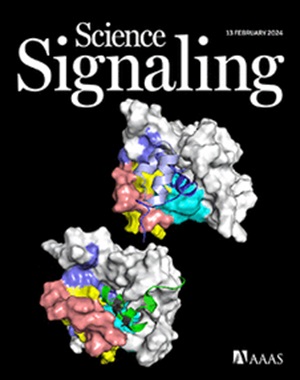Reporter-based screening identifies RAS-RAF mutations as drivers of resistance to active-state RAS inhibitors in colorectal cancer
IF 6.6
1区 生物学
Q1 BIOCHEMISTRY & MOLECULAR BIOLOGY
引用次数: 0
Abstract
Therapy-induced acquired resistance limits the clinical effectiveness of mutation-specific KRAS inhibitors in colorectal cancer (CRC). Here, we investigated whether broad-spectrum, active-state RAS inhibitors meet similar limitations. We found that KRAS-mutant CRC cell lines were sensitive to the RAS(ON) multiselective RAS inhibitor RMC-7977, given that treatment resulted in RAS-RAF-MEK-ERK pathway inhibition; halted proliferation; and, in some cases, induced apoptosis. RMC-7977 initially reduced the activity of a compartment-specific, dual-color reporter of ERK activity, with reporter reactivation emerging after long-term dose escalation. These drug-resistant cell populations exhibited distinct patterns of phospho-protein abundance, transcriptional activities, and genomic mutations, including a Y71H mutation in KRAS and an S257L mutation in RAF1. Transgenic expression of KRASG13D, Y71H or RAF1S257L in drug-sensitive CRC cells induced resistance to RMC-7977. CRC cells that were resistant to RMC-7977 and harboring RAF1S257L exhibited synergistic sensitivity to concurrent inhibition of RAS and RAF. Our findings demonstrate the power of reporter-assisted screening together with single-cell analyses for dissecting the complex landscape of therapy resistance. The strategy offers opportunities to develop clinically relevant combinatorial treatments to counteract the emergence of resistant cancer cells.
基于报告者的筛选确定RAS- raf突变是结直肠癌对活性状态RAS抑制剂耐药的驱动因素
治疗诱导的获得性耐药限制了突变特异性KRAS抑制剂在结直肠癌(CRC)中的临床疗效。在这里,我们研究了广谱活性态RAS抑制剂是否有类似的局限性。我们发现kras突变的CRC细胞系对RAS(ON)多选择性RAS抑制剂rmmc -7977敏感,因为治疗导致RAS- raf - mek - erk通路抑制;停止扩散;在某些情况下,诱导细胞凋亡。rmmc -7977最初降低了一种隔间特异性、双色ERK活性报告因子的活性,报告因子在长期剂量增加后重新激活。这些耐药细胞群表现出不同的磷酸化蛋白丰度、转录活性和基因组突变模式,包括KRAS中的Y71H突变和RAF1中的S257L突变。KRASG13D、Y71H或RAF1S257L在药物敏感的结直肠癌细胞中的转基因表达诱导了对rmmc -7977的抗性。对rmmc -7977具有抗性并携带RAF1S257L的CRC细胞对RAS和RAF的同时抑制表现出协同敏感性。我们的研究结果证明了报告辅助筛选与单细胞分析在剖析治疗耐药性的复杂景观方面的力量。该策略为开发临床相关的组合治疗提供了机会,以对抗耐药癌细胞的出现。
本文章由计算机程序翻译,如有差异,请以英文原文为准。
求助全文
约1分钟内获得全文
求助全文
来源期刊

Science Signaling
BIOCHEMISTRY & MOLECULAR BIOLOGY-CELL BIOLOGY
CiteScore
9.50
自引率
0.00%
发文量
148
审稿时长
3-8 weeks
期刊介绍:
"Science Signaling" is a reputable, peer-reviewed journal dedicated to the exploration of cell communication mechanisms, offering a comprehensive view of the intricate processes that govern cellular regulation. This journal, published weekly online by the American Association for the Advancement of Science (AAAS), is a go-to resource for the latest research in cell signaling and its various facets.
The journal's scope encompasses a broad range of topics, including the study of signaling networks, synthetic biology, systems biology, and the application of these findings in drug discovery. It also delves into the computational and modeling aspects of regulatory pathways, providing insights into how cells communicate and respond to their environment.
In addition to publishing full-length articles that report on groundbreaking research, "Science Signaling" also features reviews that synthesize current knowledge in the field, focus articles that highlight specific areas of interest, and editor-written highlights that draw attention to particularly significant studies. This mix of content ensures that the journal serves as a valuable resource for both researchers and professionals looking to stay abreast of the latest advancements in cell communication science.
 求助内容:
求助内容: 应助结果提醒方式:
应助结果提醒方式:


